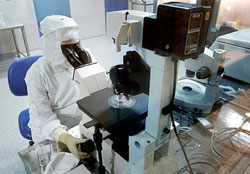Three parent IVF plan called 'dangerous and unethical' by Christian lobbyists

Lobbyist group Christian Concern issued a statement today calling the UK's proposal to allow two mothers' genetic material to be used for In vitro fertilization "dangerous and unethical."
The so-called "three-parent IVF" helps guard against genetic disorders, but opponents say that not enough information is known about the procedure and its effect on the parents and child.
The UK Parliamant released a draft of the regulations in February, outlining the issues that are expected to be voted in the next two months.
If the legislation passes, fertility clinics will be able to transfer the nucleus of an egg of one woman to the egg of another woman. Mutations are found in an egg's mitochondrion, not in the nucleus. The fertilized egg, then, would actually contain genetic material from two mothers.
Christian Concern called the developments disturbing.
"There are widespread concerns about the profound, adverse effects on a child's physiological well-being, including the impact on his or her sense of identity, which could arise from a genetic, parental connection with three, instead of two, individuals," the organization wrote in a response to the government's draft.
Whereas as IVF and surrogacy have already navigated legal and societal conflicts, three-parent IVF, or "mitochondrial donation," poses more questions for legislators and parents.
Christian Concern also questioned the amount of research that has been done regarding the procedure's potential risks, "including the loss of genetic material during transfer; the transfer of small amounts of [mitochondrial DNA or] mtDNA from the affected egg to the donor egg; and a mismatch between foreign mtDNA and nuclear DNA."
There are also concerns regarding possible genetic mutations caused by "disrupting nuclear-mitochondrial interactions, including the production of 'unhealthy mitochondria and compromised cell function.'"
However, some scientists call mitochondrial donation the next frontier in genetic research, and a means of minimizing crippling, genetic diseases.
"You see them develop a mitochondrial disease and there's bugger all you can do about it," Newcastle University researcher Douglas Turnbull told Nature.
He also addressed criticism that the mitochondrial donation will be used to select a particular eye color or other genetic preference in children.
"This is not a slippery slope, in my view," Turnbull said. "This isn't 'designer babies'. This is about preventing serious, life-threatening, disabling diseases."











